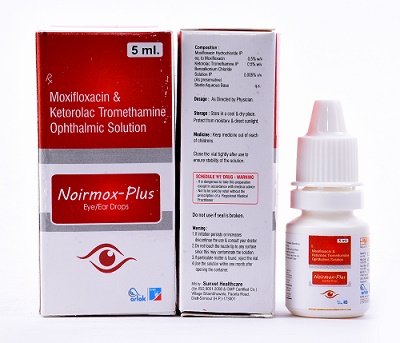Description
MOXIFLOXACIN
Treating eye infections caused by certain bacteria. Moxifloxacin drops are a fluoroquinolone. It works by killing sensitive bacteria by stopping the production of essential proteins needed by the bacteria to survive.
MECHANISM OF ACTION
Moxifloxacin is a member of the fluoroquinolone class of anti-infective drugs.
PHARMACOKINETICS
Moxifloxacin steady-state plasma pharmacokinetics were evaluated in healthy adult male and female subjects who were administered multiple bilateral,topical ocular doses of MOXEZA™ solution two times daily for four days with a final dose on day 5. The average steady-state AUC0-12 was 8.17 ± 5.31 ng•h/mL. Moxifloxacin Cmax following twice-daily bilateral ophthalmic administration of moxifloxacin AF 0.5% for 5 days is approximately 0.02% of that achieved with the oral formulation of moxifloxacin hydrochloride (Cmax following oral dosing of 400 mg AVELOX*, 4.5 ± 0.5 mcg/mL).
KETOROLAC TROMETHAMINE
Treating eye pain and swelling following cataract surgery. It may also be used for other conditions as determined by your doctor.
Ketorolac tromethamine drops are a nonsteroidal anti-inflammatory drug (NSAID). It works by blocking the production of prostaglandin, a substance that causes pain and swelling.
MECHANISM OF ACTION
Ketorolac tromethamine is a nonsteriodal anti-inflamatory drug nonsteroidal anti-inflammatory which, when administered systemically, has demonstrated analgesic, anti-inflammatory, and anti-pyretic activity. The mechanism of its action is thought to be due to its ability to inhibit prostaglandin biosynthesis. Ketorolac tromethamine given systemically does not cause pupil constriction.
PHARMACOKINETICS
One drop (0.05 mL) of 0.5% ketorolac tromethamine ophthalmic solution was instilled into one eye and one drop of vehicle into the other eye TID in 26 normal subjects. Only 5 of 26 subjects had a detectable amount of ketorolac in their plasma (range 10.7 to 22 5 ng/mL) at day 10 during topical ocular treatment. When ketorolac tromethamine 10 mg is administered systemically every 6 hours, peak plasma levels at steady state are around 960 ng/mL.













